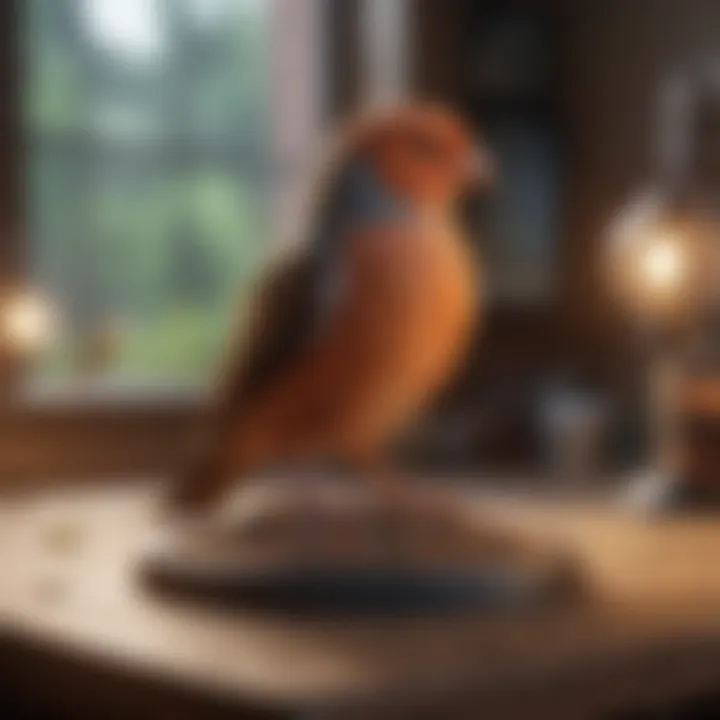Protecting Pet Birds: Safe Practices During Pregnancy


Intro
Navigating the journey of pet birds during pregnancy requires a blend of knowledge, instinct, and a keen awareness of your feathered companions' needs. While many people think of pregnancy in terms of mammals, the avian world comes with its own set of rules and challenges. Knowing how to create a stable environment can make all the difference, not just for the mother bird but for her unborn chicks as well.
Why is this Important? Every bird species has unique characteristics and requirements that need to be respected and understood. As pet bird owners and aspiring bird parents, it falls upon you to cultivate a nurturing atmosphere that prioritizes health, emotional well-being, and safety.
This guide delves into the essentials that every bird keeper should be aware of to protect their birds during this critical time. From providing appropriate habitats to ensuring proper nutrition, each aspect plays a pivotal role in making this journey successful.
Let’s dive deeper into the avian care basics to set the foundation for a nurturing environment.
Understanding Avian Physiology
Grasping the basic principles of avian physiology is essential for anyone looking to ensure the safety and wellness of pet birds during pregnancy. Birds possess unique biological attributes that influence their reproductive health, behavior, and overall well-being. By understanding these physiological features, bird owners can make informed decisions that cater specifically to their feathered friends’ needs, especially at such a delicate time.
When birds enter the critical stage of pregnancy, their bodily functions transform significantly to support potential offspring. A deeper knowledge of these physiological changes can also aid in identifying any issues or signs of distress that may arise. For example, awareness of their metabolic rates or hormonal fluctuations can help owners modify their care practices accordingly. Such modifications include diet adjustments and habitat enhancements to foster a nurturing environment.
By paying attention to avian physiology, owners can tailor their actions to align with the birds’ natural instincts. This shows a responsibility and commitment to their pet’s needs, ultimately contributing to a healthier and safer pregnancy.
Reproductive Cycle of Birds
The reproductive cycle of birds can be described as a fascinating interplay of hormones, behavioral shifts, and environmental triggers. It usually begins with the breeding season, which varies by species. Most avian species rely on specific cues from their surroundings, such as daylight length, temperature, and available resources, to signal that it is time to mate.
During mating season, female birds experience a series of physiological changes, including the development of follicles in the ovaries. These changes are influenced primarily by an increase in reproductive hormones like estrogen. This period often brings about noticeable behavioral changes as well. For instance, owners may notice their birds becoming more vocal, engaging in courtship displays, or nesting activities.
The reproductive cycle generally consists of the following stages:
- Courtship: Characterized by behaviors to attract a mate, which can include singing, dancing, or showcasing physical plumage.
- Mating: The actual copulation event, resulting in fertilization of eggs.
- Nesting: The parents prepare a safe space for the potential hatchlings by gathering materials and creating a suitable nest.
- Egg-laying: Once the nesting phase is complete, the female will lay fertilized eggs, a process that can take a few days to complete.
Understanding this cycle is key, especially if the owner intends to breed their birds. Monitoring signs of readiness can help avoid unnecessary stress on the birds and ensure optimal conditions for pregnancy.
Impact of Pregnancy on Health
The health of a pregnant bird is both fragile and paramount. During this period, their bodies undergo changes that directly affect their physical state, nutrient requirements, and overall stress levels. Without the right awareness, owners may inadvertently endanger their birds’ health.
Physiologically, pregnant birds exhibit increased energy demands due to the need to nurture their developing eggs. It's crucial for owners to recognize that, similar to other animals, avian mothers may experience complications—like egg-binding or nutritional deficiencies—if their needs aren't met appropriately.
Some impacts during this period may include:
- Nutritional needs: As a bird prepares for hatching, a balanced diet enriched with protein, vitamins, and minerals becomes critical. Specialized aviary nutritional formulas can help in these situations, providing essential nutrients to the mother bird.
- Behavioral changes: Expectant birds may exhibit mood swings, become more aggressive, or seek solitude. Understanding these shifts as part of the natural process can help owners provide the correct environment and support.
- Physical stress: Overexertion can lead to health issues, so providing ample rest periods and a calm habitat is essential. High-stress situations can negatively affect the pregnancy, which is something that every bird owner should aim to minimize.
In light of these considerations, it's vital for owners to maintain an observant eye on their bird’s health. A proactive approach can lead to early identification of any problems, increasing the likelihood of a successful and healthy pregnancy.
"Being aware of your bird’s physiological needs during pregnancy is not just a matter of pride; it's a commitment to their health and happiness."
By focusing on how avian physiology influences both reproductive cycles and health during pregnancy, pet owners will be better equipped to provide a nurturing environment, ensuring that their birds thrive during a pivotal moment in their lives.
Assessing Environmental Factors
Evaluating the environmental factors surrounding pet birds during pregnancy is critical. The right environment directly impacts the health and comfort of the avian mother and, subsequently, the hatchlings. A well-thought-out habitat can make a world of difference in reducing stress and supporting a successful breeding experience.
When considering environmental factors, it's important to look at both the physical and emotional needs of your bird. A space that fosters comfort can significantly improve the overall health of pregnant birds. Thus, ensuring that they have a suitable environment should be a priority for every pet bird owner.
Creating a Safe Habitat
Creating a safe habitat includes not just providing a spacious cage but also optimizing the placement of the cage, selecting the right materials, and maintaining cleanliness. Safety first should be your mantra. Birds appreciate a space where they feel secure from potential threats, whether they come from other pets, household noises, or drafts.
- Cage Size: The cage should be spacious enough for the bird to stretch its wings and move around without feeling cramped. It’s like giving them their own little castle, away from the worries of the world.
- Location: Position the cage in a quiet area of your home. Avoid placing it near loud appliances or busy pathways where constant movement might stress your feathered friend.
- Bedding and Accessories: Use bedding that is both safe and comfortable. Avoid cedar or pine shavings as they can be harmful. Instead, opt for paper-based or aspen shavings.
Make sure that perches are of varying thickness to promote foot health, and toys should be made of safe, non-toxic materials.
Creating a harmonious environment not only caters to the mother bird’s needs but fosters a nurturing atmosphere for the chicks once they arrive.


Understanding Toxic Materials
Understanding and eliminating toxic materials is paramount in safeguarding not only pregnant birds but also the health of their offspring. Birds are notably sensitive to their surroundings, and even trace amounts of certain chemicals can be detrimental.
Common toxins include:
- Heavy Metals: Lead and zinc are just two examples of heavy metals that can be found in paint and some metals. Birds can succumb to heavy metal poisoning relatively quickly, which is why it’s crucial to check their environment regularly.
- Household Chemicals: Cleaning products, air fresheners, and even certain types of candles can release volatile organic compounds (VOCs) that harm birds. Always opt for bird-safe brands or natural cleaning alternatives.
- Plants: Many pet birds have a curious nature and might nibble on houseplants. However, many common houseplants are toxic. Research before introducing any green friends into your home, ensuring they are safe for your feathered companions.
"Birds don't know what is bad for them. It is upon us to create a safe environment to protect them from harm."
Creating an atmosphere where your pet birds can thrive is not a one-time task but a continuous responsibility. It requires periodic assessment and adjustment of living conditions. By educating yourself about proper habitats and recognizing harmful elements, you can ensure the safety and well-being of your pet birds during this crucial time in their life.
Nutritional Requirements
The significance of nutritional requirements cannot be overemphasized when it comes to the well-being of pet birds during pregnancy. Just as with humans, the right diet is crucial to fostering a healthy environment for avian mothers and their future hatchlings. Not only does proper nutrition support the health of the pregnant bird, but it also significantly influences the vitality of the chicks at hatching.
Dietary Recommendations
A well-rounded diet is essential. It can be easy to overlook what our feathered friends need, but understanding those dietary requirements can make a world of difference. Here are some key points to keep in mind:
- High-Quality Pellets: Start with a good quality pelleted diet; they are designed to provide a balanced mix of nutrients. Look for those specially formulated for breeding or pregnant birds. The pellets should contain a blend of seeds, grains, and vegetables.
- Fresh Fruits and Veggies: Fresh produce forms the backbone of an optimal diet. Leafy greens like spinach and kale, along with carrots, sweet potatoes, and apples, are particularly beneficial. Fruits and vegetables not only provide hydration but also essential vitamins that pellets may lack.
- Protein Sources: Since the needs increase when a bird is expecting, consider incorporating protein-rich foods such as boiled eggs, cooked legumes, and small amounts of insects or mealworms if your bird eats them. This additional protein is vital for tissue growth and energy.
- Avoid Processed Foods: Steer clear of processed human foods, which can be unhealthy for birds. Ingredients such as salt, sugar, and preservatives do not belong in a bird’s diet and might lead to health problems.
- Clean Water: Always ensure that fresh and clean water is available. Hydration is as essential as food, especially during pregnancy, when the body's demands are elevated.
Necessary Supplements
Feeding a balanced diet is important, but sometimes, it may not be sufficient. Supplements can help to fill any gaps and ensure optimal health during this crucial time. Here are some supplements that can be beneficial:
- Calcium Supplements: The formation of eggs and the overall health of the bird requires calcium. Consider offering cuttlebone or a commercial calcium supplement to support this need. Lack of calcium can result in eggs that are thin-shelled, leading to difficulties in hatching.
- Multivitamins: A general multivitamin formulated for birds can provide those extra micronutrients essential for a healthy pregnancy. This should not replace a balanced diet but serve as a safety net to cover any nutritional deficiencies.
- Omega Fatty Acids: These can help in reducing inflammation and maintaining healthy skin and feathers. Fish oil or flaxseed oil may be administered in small doses, provided that your vet agrees.
Proper nutrition and thoughtful supplementation lay the groundwork for a successful breeding season. An underlying crucial aspect of this guide is ensuring that bird owners are equipped to create environments promoting a healthy pregnancy for their pet birds.
"An ounce of prevention is worth a pound of cure; providing a proper nutritional foundation can lead to healthier chicks and happier bird owners."
Stay educated, take care of your feathered friend, and enjoy the beautiful journey of avian pregnancy.
Behavioral Changes During Pregnancy
Behavioral changes in pet birds during pregnancy are of utmost importance in ensuring their overall health and safety. When a bird is expecting, it undergoes incredible physical and emotional transformations that can manifest in various ways. Recognizing these changes is critical for avian owners, as it helps in creating an environment that supports the well-being of both the mother bird and her future chicks.
Understanding these behavioral shifts can also aid in identifying any potential health issues early on. Moreover, being well-informed allows bird owners to take proactive measures to lessen stressors and encourage a calm atmosphere during this crucial time.
Common Behavioral Indicators
There are a few tell-tale signs that indicate a pregnant bird is experiencing behavioral changes. Notably, these changes can vary widely depending on the species of the bird as well as individual temperaments. Here are some common indicators to watch for:
- Nesting Behaviors: One of the first things to notice is the urge to build a nest. The mother bird may start gathering materials from its surroundings, such as twigs, paper, or other soft materials. Observing this behavior can indicate readiness for the breeding phase.
- Increased Vocalization: Some birds may chatter more or produce different calls. This vocal change may serve as communication for the mating pair or an expression of anxiety about the upcoming responsibilities of parenthood.
- Aggression or Irritability: Pregnant birds might become more territorial or defensive. They may react negatively to perceived threats, which could be anything from other pets to changes in their environment.
- Changes in Appetite: It's not uncommon for a bird’s appetite to fluctuate during pregnancy. Some birds may eat more as they prepare for the demands of caring for their chicks, while others may lose interest in food temporarily.
Recognizing these signs is vital for bird owners. Keeping a close eye on such behaviors can help in grasping the emotional state of the bird and ensuring its needs are adequately met.
Managing Stress and Anxiety
Managing stress and anxiety in pregnant birds is crucial for their health and the health of their hatchlings. Birds are remarkably sensitive creatures, and any disruption in their environment can lead to feelings of stress, which might harm them and their eggs. Here are essential strategies for bird owners to help reduce stress:
- Environment Control: Create a calm and stable environment. Keep noise levels down, especially during nesting. Dim lighting can also help reduce anxiety, as birds are known to feel more secure in a shaded, quiet space.
- Consistent Routine: Try to maintain a consistent daily routine. This may include regular feeding times and interaction schedules. Birds thrive on predictability, and having a routine can help them feel secure as they navigate through this transitional phase.
- Provide Safe Spaces: Ensure the bird has access to safe, secluded areas where they can retreat. This could be a quiet corner of the cage with softer bedding where they can feel at ease.
It is important to create a nurturing environment that addresses the emotional needs of your pregnant bird to ensure healthy hatchlings and a happy mom.
- Gentle Interaction: Approach interactions with your bird carefully. Avoid abrupt movements or loud sounds that might startle them. Use a calm voice and gentle movements when handling or interacting with your pet.
- Consult a Vet: If anxiety or stress levels seem unusually high, consulting a veterinarian who specializes in avian care is a good step. They can help in devising personalized strategies suited for your bird's specific needs.
By being attuned to behavioral changes and managing stress effectively, bird owners can play a pivotal role in ensuring the welfare of their pet birds during pregnancy. These measures not only benefit the mother bird but also set the stage for a healthy brood.
Preventive Healthcare


Preventive healthcare plays a crucial role in ensuring the safety and well-being of pet birds during pregnancy. Stress during this sensitive period can lead to various health issues, not only for the expectant bird but also for future hatchlings. Therefore, understanding the principles of preventive care can empower bird owners to create optimal environments that support their pets' health and contribute to a successful breeding experience.
Routine veterinary care is not just about managing illnesses; it’s proactive. Regular check-ups can help catch potential problems early, before they evolve into serious conditions that might pose risks during pregnancy. A vet can provide insights tailored to specific bird species and their unique needs.
"A stitch in time saves nine." This age-old adage truly encapsulates the essence of preventive care. A small preventative measure can spare significant health complications down the line.
In addition to check-ups, preventive healthcare encompasses proper nutrition, a stress-free habitat, and vaccination protocols. Keeping track of the bird's health history, understanding its dietary preferences, and ensuring a clean living environment can significantly impact its overall health during sensitive times.
Regular Veterinary Check-Ups
Regular veterinary check-ups should be a cornerstone of preventive healthcare. Accessible to birds of all shapes and sizes, these appointments allow a veterinarian to assess the health of the expecting bird comprehensively.
During these visits, the vet will likely conduct a physical examination, check for signs of illness, assess weight and body condition, and even suggest necessary vaccinations. Such assessments can shed light on any underlying health issues that may compromise both the mother bird and her offspring.
Moreover, these visits offer an opportunity for owners to discuss concerns about behavioral changes or environmental factors affecting their pet’s well-being. Being proactive about avian health not only ensures safety but can ease anxiety for both the bird and its owner.
Vaccination Needs
Vaccination needs form a part of preventive healthcare critical for pregnant birds. Just as humans have vaccines to fend off illnesses, birds can also benefit from immunizations. Vaccines work by bolstering the bird’s immune system, making it more resilient to diseases that could jeopardize the health of hers and her future chicks.
Key vaccinations to consider include:
- Polyoma Virus: This viral infection can be deadly, particularly for young birds.
- Psittacine Beak and Feather Disease: A devastating condition that can impact both adult and juvenile birds; vaccination can help prevent its spread.
Understanding the vaccination schedule and adhering to it can vastly improve the overall health of both the mother and the hatchlings. Engaging with a knowledgeable veterinarian to create a vaccination plan prepares pet owners for any potential adversities during the critical phases of breeding.
Breeding Management
Breeding management is essential for ensuring the safety and well-being of pet birds during pregnancy. Choosing the right breeding partners and monitoring nesting behavior can have a profound impact on the health of both the mother and the future hatchlings. This section delves into these critical aspects, offering detailed insights for bird owners and aspiring breeders.
Choosing Ideal Breeding Partners
When it comes to bird breeding, the selection of partners is not something to take lightly. Ideal breeding partners can significantly influence the genetics, temperament, and health of the offspring. It’s much like a dance; you want partners that complement each other’s strengths and weaknesses. Consider the following factors:
- Species Compatibility: Ensure that the birds belong to the same species. Hybridization may seem interesting but often leads to unexpected health issues.
- Health Status: Both birds should be in good health, free from diseases that can affect the babies. A trip to the vet can do wonders here, ensuring both parents are fit as a fiddle.
- Temperament: A calm and nurturing disposition in both birds is ideal. You wouldn’t want a hot-headed parent raising chicks!
- Genetics: Consider the potential health issues that could arise from certain genetic pairings. Some traits like feather structure or beak size can be hereditary.
Formulating a good breeding plan around these factors helps create a healthy environment for both the mom and her babies. It reduces complications during the breeding process, as well as increases the likelihood of raising healthy offspring.
Monitoring Nesting Behavior
Once your breeding partners are chosen, it's time to monitor their nesting behavior, which provides invaluable insights into the health of the mother bird and the readiness of the nesting environment. A few key points to keep in mind include:
- Nest Building: Observe how the female bird constructs her nest. This is a natural instinct, and a lack of activity can be a sign of stress or unease in her surroundings.
- Egg Laying: During nesting, the female's behavior might change. If she starts spending more time in the nest, this is usually a sign she’s ready to lay eggs. Pay attention to that, so you can make any needed adjustments to her habitat.
- Interaction with Partner: The relationship between the breeding pairs can influence nesting success. A supportive mate often aids in stress reduction for the female.
Remember, a happy bird makes for a happy nest!
- Environmental Factors: Keep an eye on environmental elements like temperature and noise levels, which can affect how comfortable the mother bird feels in her nesting space.
- Avoid Disturbances: Limit handling of the birds during this period. Too much human interaction can stress them out, making them less likely to focus on nesting.
Monitoring these indicators allows you to adjust the environment or seek veterinary advice if any issues arise during this critical time. The goal is to create a calm and supportive setting, laying the groundwork for not just healthy chicks, but also a well-adjusted mother bird.
In closing, effective breeding management acts as a cornerstone for avian health and safety during pregnancy. It involves careful partner selection and diligent observation of nesting behavior to foster a nurturing environment for developing families. This forms the bedrock upon which successful and healthy bird breeding is built.
Post-Pregnancy Care
Taking care of pet birds after they have laid their eggs or given birth is essential for their health and well-being. Pet owners must step up their game during this critical phase. Not only does this time frame include the new hatchlings, but the mother bird also requires attention. Ignoring the needs of either could lead to long-term issues for both.
The post-pregnancy period is a time of depletion for the mother bird. She has devoted significant energy to laying eggs or nurturing her young. Therefore, providing her with a stress-free environment is key. This phase impacts not just the mother, but also the hatchlings, who are especially vulnerable in their early days.
It’s crucial to monitor the behaviors and health of both the mother and her young birds during this period. Making sure that they feel safe and well is a step towards healthy development. Fostering an environment where the mother can recuperate will ensure she can properly care for her hatchlings without added stress.
"A happy mother bird can significantly increase the chances of healthy, thriving young."


Checking the Health of Hatchlings
Once the eggs have hatched, checking the health of these tiny creatures becomes the number one priority. Knowing what to look for can save lives and set the stage for strong development.
- Physical Condition: Look for any signs of deformities or issues such as difficulty breathing or not moving appropriately. Hatchlings are often fragile, and any abnormalities should be addressed quickly.
- Behavioral Signs: Healthy hatchlings typically exhibit strong feeding behaviors. If they are not actively seeking food or chirping, it might indicate a problem.
- Temperature: It is essential to keep the hatchlings warm. Using a heat lamp can be beneficial in maintaining an adequate temperature for the nest.
Regular check-ups are advisable to monitor their growth trajectory. A veterinarian specialized in avian care can offer invaluable advice on the specific conditions that need to be met for the young birds to thrive.
Continued Nutritional Support
As if raising hatchlings weren’t enough sweat for the brow, nutritional requirements become a key consideration in the post-pregnancy phase. Adequate nutrition plays a role in the health of both the mother bird and her young.
- Balanced Diet: The mother bird needs nutrient-rich foods that include seeds, fruits, and specially formulated pellets. This helps replenish her energy reserves as she continues to feed her young.
- Supplements: Certain vitamins and minerals can enhance the diet. Calcium is critical for the mother’s recovery and also aids in the development of her hatchlings.
- Hydration: Fresh water must always be available. Dehydration can hinder recovery and affect feeding behavior in hatchlings.
Watching how the mother bird reacts to her diet can be quite telling. If she seems lethargic or shows a decrease in feeding frequency, it might be time to consult a vet. Keeping a close eye on both mother and hatchlings can ensure that they receive the necessary nutritional support during this fundamental stage.
Legal and Ethical Considerations
When diving into the complexities of breeding pet birds, understanding the legal and ethical landscape is not just important—it's crucial. Laws governing bird breeding can vary significantly based on location, species, and conservation status. This section will clarify how these regulations impact pet bird owners and breeders alike, offering insights on navigating these often murky waters.
Understanding Breeding Laws
Regulations regarding breeding practices serve multiple purposes, from protecting endangered species to ensuring humane treatment. In many regions, it is illegal to breed certain bird species without a special permit. This is often the case for birds that are threatened or at risk of extinction. For pet bird owners, understanding these laws is essential.
Here are some essential points to consider:
- Identify Your Bird Species: Certain species might be federally protected or classified under local laws. Take a moment to research whether your pet bird falls into any such categories.
- Obtain Necessary Permits: If breeding specific species is permitted, securing the right permits is key. This often involves an application process that may include proving your knowledge and capability in caring for the birds properly.
- Comply With Housing Regulations: Many areas also have regulations around how birds must be housed to ensure their welfare. Breeding cages often need to meet specific criteria for size and safety.
"Ignorance of the law is no excuse," so it’s essential to stay informed and compliant to avoid legal trouble and ensure the well-being of your birds.
Ethical Breeding Practices
Beyond the laws, there’s an ethical dimension to breeding that every responsible pet owner should consider. Ethical breeding goes hand in hand with the idea of maintaining the health and happiness of the birds. Here are some guidelines to keep in mind:
- Health First: Ensure that both the male and female birds are healthy before considering breeding. This can reduce the risk of passing genetic diseases to the offspring.
- Focus on Quality Over Quantity: Breeding should never be about cashing in on demand. Instead, aim to breed for quality of life for both the parents and the chicks. Bringing more birds into the world without a plan for their futures can lead to overcrowding, mistreatment, and abandonment.
- Educate Yourself Properly: Familiarize yourself with avian genetics and the particular needs of the species you are working with. Not all birds are suited for every environment or situation, and understanding the intricacies can make a world of difference.
- Responsible Placement: When you have hatchlings, think critically about where they’ll go. Ensure that new owners are suited to care for the birds they’re adopting, bolstering community support through educational outreach.
By prioritizing ethical practices, you foster a community of informed bird owners and promote the long-term health of avian populations, both domesticated and wild.
Empowering Bird Owners
Owning a pet bird, especially during the delicate time of pregnancy, can feel like an overwhelming responsibility. Understanding this complexity is crucial not just for the health of the bird but also for fostering a bond between the owner and their feathered friend. Empowering bird owners is about providing them with the knowledge, tools, and support needed to navigate this challenging phase.
One primary consideration is that informed owners can make sound decisions based on facts rather than myths or hearsay. For instance, many people may believe that simply providing food and a perch is enough. In reality, understanding the nuanced needs of a pregnant bird can prevent various complications. This includes insights into dietary changes that support both the mother and future hatchlings, or recognizing the signs of stress that could endanger their health.
"Knowledge is power, especially when it comes to the well-being of our pets. The more we learn, the better decisions we make for their care."
This empowerment also translates to proactive health measures. With proper education, owners will be equipped to identify potential health issues early on. They can establish routines for regular check-ups, thereby ensuring timely intervention if needed.
The act of empowering also fosters a community spirit among bird owners. When they feel knowledgeable and confident, they are more likely to share insights, form connections, and support one another. This collective wisdom can be an invaluable resource when navigating issues related to pregnancy or other health concerns.
Educational Resources
A strong foundation for empowering bird owners lies in educational resources. Various platforms, including books, blogs, and websites, offer a treasure trove of information pertinent to caring for pet birds during pregnancy. These resources delve deep into avian biology, health care practices, and normal versus abnormal behavior patterns.
Some recommended sources of information include:
- Books: Titles such as The Complete Pet Bird Owner’s Handbook provide foundational knowledge for new bird owners.
- Websites: Websites like wikipedia.org and britannica.com provide detailed articles on various bird species, their care needs, and behavioral insights, which are crucial during pregnancy.
- Forums: Engaging in online forums, such as those on reddit.com or community groups on facebook.com, allows bird owners to share experiences and advice, cultivating a learning environment that benefits all.
In addition, attending workshops or webinars where veterinarians and avian specialists share their knowledge can greatly enhance an owner’s understanding and confidence.
Community Support Systems
Creating an empathetic and knowledgeable community support system is vital for bird owners, especially during pregnancy. Being part of a community allows individuals to share first-hand experiences, gather advice, and gain comfort from peers facing similar challenges.
These support systems can take various forms:
- Local Bird Clubs: Joining local clubs can connect owners with seasoned bird fanciers who have successfully navigated the unique circumstances of pregnancy. Members can discuss breeding strategies, health concerns, and moral support.
- Online Support Groups: Virtual platforms facilitate connection across geographical boundaries. Online groups focused specifically on avian care provide a continuous source of support and encouragement.
- Vet Consultations: Establishing a relationship with a knowledgeable avian veterinarian means having a resource readily available for any queries, concerns, or emergencies.















